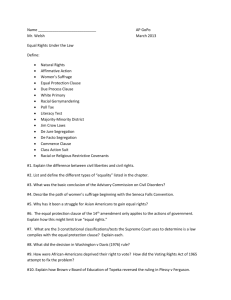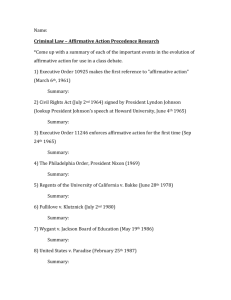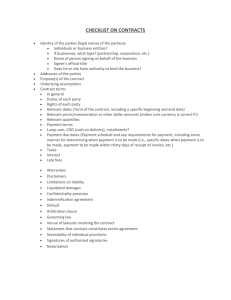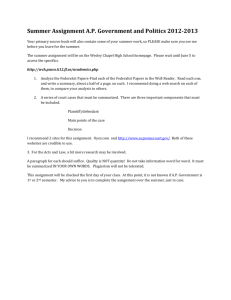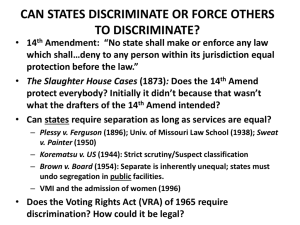Equality of opportunity
advertisement
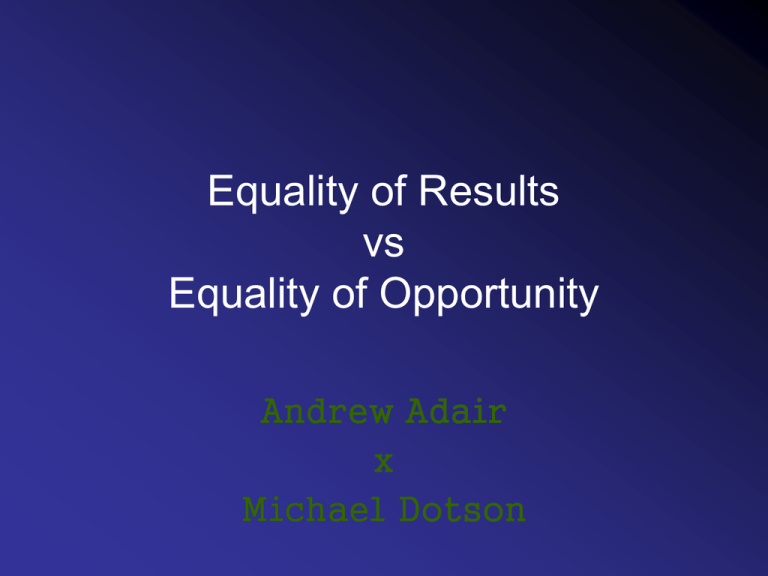
Equality of Results vs Equality of Opportunity Andrew Adair x Michael Dotson Equality of opportunity means that every person is afforded the same access to a benefit as every other person. Equality of results means that every person actually receives the same benefit as everyone else. Amendment XIV Equal Protection Clause Section 1. All persons born or naturalized in the United States, and subject to the jurisdiction thereof, are citizens of the United States and of the State wherein they reside. No State shall make or enforce any law which shall abridge the privileges or immunities of citizens of the United States; nor shall any State deprive any person of life, liberty, or property, without due process of law; nor deny to any person within its jurisdiction the equal protection of the laws. • Summary: Everyone has equal protection under national and state law Civil Rights Act of 1964 • Since the Equal protection clause only grants equal protection not equal rights this type of legislation was passed in the 1960s Video Affirmative action was implemented to ensure equal opportunity under the law Supreme Court Cases Regents of the University of California vs. Bakke • • • • • Petitioner: Regents of the University of California Respondent: Bakke Decided By: Burger Court Issues: Civil Rights, Affirmative Action Question: Did the University of California violate the Fourteenth Amendment's equal protection clause, and the Civil Rights Act of 1964, by practicing an affirmative action policy that resulted in the repeated rejection of Bakke's application for admission to its medical school? • Decision: There was no single majority opinion. One justice argued that the rigid use of racial quotas as employed at the school violated the equal protection clause of the Fourteenth Amendment. The remaining four justices held that the use of race as a criterion in admissions decisions in higher education was constitutionally permissible. Powell joined that opinion as well, contending that the use of race was permissible as one of several admission criteria United Steelworkers vs. Weber • • • Petitioner: United Steelworkers of America Respondent: Weber Issues: Civil Rights, Affirmative Action • Decision: No. The Court held that the training scheme was legitimate because the 1964 Act "did not intend to prohibit the private sector from taking effective steps" to implement the goals of Title VII. • Question: Did United and Kaiser Aluminum's training scheme violate Title VII of the 1964 Civil Rights Act prohibiting discrimination on the basis of race? Richmond vs. Croson • • • Appellate: J.A. Croson Co. Appellant: Richmond Decided By: Rehnquist Court (19881990) • Question: Did the Richmond law violate the Equal Protection Clause of the Fourteenth Amendment? • Decision: Yes. the Court held that "generalized assertions" of past racial discrimination could not justify "rigid" racial quotas for the awarding of public contracts. Grutter vs. Bollinger • • • • Petitioner: Grutter Respondent: Bollinger Decided By: Rehnquist Court Issues: Civil Rights, Affirmative Action • Question: Does the University of Michigan Law School's use of racial preferences in student admissions violate the Equal Protection Clause of the Fourteenth Amendment or Title VI of the Civil Rights Act of 1964? • Decision: No. the Court held that the Equal Protection Clause does not prohibit the Law School's narrowly tailored use of race in admissions decisions. The Court stated that since a review of the applicants was thorough, it was not based on race. Gratz vs. Bollinger • • Petitioner: Gratz Respondent: Bollinger • Decided By: Rehnquist Court • Issues: Civil Rights, Affirmative Action • Question: Does the University of Michigan's use of racial preferences in undergraduate admissions violate the Equal Protection Clause of the Fourteenth Amendment or Title VI of the Civil Rights Act of 1964? • Decision: Yes. the Court held that the University of Michigan's use of racial preferences in undergraduate admissions violates both the Equal Protection Clause and Title VI. Texas vs. Lesage • • Petitioner: Texas Respondent: Lesage • • Decided By: Rehnquist Court Issues: Civil Rights, Affirmative Action • Question: Did the Court of Appeals err in holding that the University of Texas was not entitled to summary judgment for its rejection of an African immigrant Ph.D. applicant of Caucasian descent even if he would have been rejected under a race-neutral policy? • Decision: Yes. the Court held that the Court of Appeals held that University of Texas was not entitled to summary judgment on Lesage's section 1983 claim for damages relating to the rejection of his application for the 1996-1997 academic year even if he would have been denied admission under a race-neutral policy, its decision contradicts our holding in Mt. Healthy Political Cartoons Interpretation Timeline 1868: XIVth Amendment proposed- Everyone has equal protection under law 1964: Civil Rights Act of 1964- Established the Civil rights equality 1978: Regents of the University of California v. Bakke1979: United Steelworkers of America v. Weber 1988:Richmond v. J.A. Croson Co. 2003: Grutter v. Bollinger 2003:Gratz v. Bollinger The Specific interpretation of the liberties given is up to the discretion of the court due to the various circumstances of the cases Bibliography • http://www.oyez.org/cases/ • Http://www.cartoonstock.com • http://www.metacafe.com/watch/3037271/ affirmative_action/

